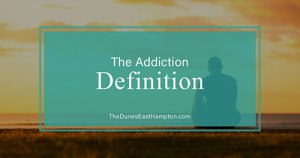Addiction is a complex disease that people often don’t understand. To understand it better, you need a working definition. The addiction definition means being dependent on a particular substance. That dependence can be chemical, physical, emotional or behavioral, but you can overcome any of it with the right treatment and support.
Defining Addiction Physically
 When most people try to define addiction, they often refer to the physical aspects. While this doesn’t cover the whole issue, physical factors are definitely part of the disease.
When most people try to define addiction, they often refer to the physical aspects. While this doesn’t cover the whole issue, physical factors are definitely part of the disease.
Once a person has an addiction, his or her brain will actually change. This is a chemical and functional change that reflects the development of a dependence. In most cases, a flood of dopamine to the brain changes it.
When the brain experiences a huge rush of feel-good chemicals, it sets a new bar for happiness or enjoyment. In order to feel that way again, you’ll need at least the same amount of the substance. Without the substance, you might feel unwell or unhappy. This is the foundation for a chemical dependence on a substance like drugs or alcohol.
Defining Addiction Emotionally
Addiction can also be emotional. It may have roots in emotional causes, and the way that you process feelings and emotions can impact it.
For example, a history of trauma can result in addiction. People who suffer from abuse, or who witness violence, are more likely to struggle with addiction in the future. This happens largely because a person is damaged emotionally, allowing addiction to take root.
Defining Addiction Behaviorally
It’s no secret that addiction can also impact your behavior. It can alter your personality and cause you to make decisions you would never make if you were sober.
For example, a person who loves his or her children might choose to drive them while under the influence of alcohol. This isn’t a logical or rational decision. Clearly, addiction impacts a person’s behavior.
You can also spot addiction just by looking for behavioral changes. Addiction can cause people to reduce hygiene and grooming habits, rapidly lose weight or change their sleeping habits.
Addiction Persists Despite Negative Consequences
Often, what causes people to realize that they’re struggling with addiction is when the consequences appear. If you continue using a substance after criminal, legal, financial or relationship issues, then it’s likely you have an addiction.
The Addiction Definition Doesn’t Have to Define You
Active addiction doesn’t have to last forever. You can rewrite your history at The Dunes of East Hampton. Alcohol and drug addiction treatment can give you the tools and resources you need to overcome dependency. In an upscale environment where safety is a priority, you can expect all the following:
- Group therapy
- Family therapy
- Luxurious amenities
- Flexible and customized programs
- Behavioral therapy
No matter what the addiction definition, it’s a serious condition that deserves attention. At The Dunes of East Hampton in New York, we design our programs to help you overcome active addiction. Call 877-818-5539 to take the next step towards a life of health, happiness, and recovery.







